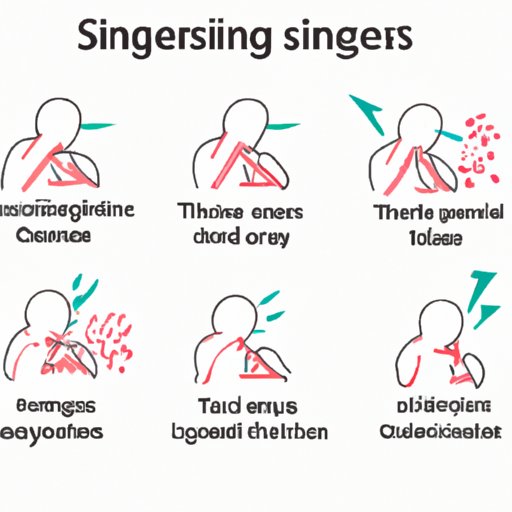
Introduction
Sneezing is an involuntary expulsion of air from the nose and mouth, often accompanied by a loud sound. Although it may seem inconvenient or embarrassing, sneezing is a natural and important bodily function that helps us expel irritants and keep our respiratory system healthy. However, for people with allergies or other conditions that cause excessive sneezing, it can be a frustrating and uncomfortable experience.
In this article, we’ll explore the science behind sneezing, common and unusual sneeze triggers, practical tips for managing sneezing, cultural attitudes towards sneezing, and famous sneezers throughout history.
Common Sneeze Triggers
The most common sneeze triggers are dust, pollen, and animal dander. These tiny particles can irritate the lining of the nose, causing the body to produce a sneeze reflex to expel them. Other common triggers include mold spores, cigarette smoke, and perfumes or other strong scents.
To avoid or minimize exposure to these triggers, it’s important to keep your home clean and free of dust, pet dander, and mold. Use a HEPA air filter to remove airborne particles, and avoid smoking or being around people who smoke. If you have allergies, consider taking allergy medication or using a nasal spray to reduce inflammation and prevent sneezing.
The Science of Sneezing
Sneezing is a complex process that involves several different parts of the body. It begins with an irritation of the nasal lining, which sends a signal to the brain to initiate the sneeze reflex. This reflex involves a chain reaction of muscle contractions that forces air out of the nose and mouth at high speeds.
The anatomy of the nose and throat plays a key role in sneezing. The nasal passages are lined with tiny hairs called cilia, which help to filter out foreign particles. When these particles become trapped in the nasal lining, they can stimulate nerve endings that trigger the sneeze reflex. The soft palate and uvula also play a role in sneezing, as they help to direct the flow of air and protect the airway.
Sneezing is also an important part of the immune system. When the body detects a potential threat, such as a virus or bacteria, it produces mucus to try to flush it out. Sneezing helps to expel this mucus and the harmful pathogens it may contain, preventing them from spreading further into the respiratory system.
Unusual Sneeze Triggers
In addition to common triggers like dust and pollen, there are several less obvious things that can cause sneezing. Bright lights, such as sunlight or fluorescent bulbs, can trigger sneezing in some people. This phenomenon is known as photic sneeze reflex, and it affects up to 35% of the population. Researchers believe it may be caused by a connection between the optic nerve and the trigeminal nerve, which controls the muscles involved in sneezing.
Another less common sneeze trigger is extreme temperatures. Exposure to hot or cold air can cause nasal passages to constrict or dilate, which can lead to sneezing. Emotional stimuli, such as stress, anxiety, or excitement, can also trigger sneezing in some people.
To avoid or minimize exposure to these unusual triggers, it may be necessary to modify your environment or behavior. If bright lights trigger your sneezing, you may need to wear sunglasses or avoid bright environments. If extreme temperatures are the problem, try to maintain a consistent indoor temperature or wear appropriate clothing to protect your nose from sudden changes. If emotional triggers are the issue, try relaxation techniques like deep breathing or meditation to calm your nerves.
Managing Sneezing
If you struggle with frequent or excessive sneezing, there are several practical tips you can use to manage your symptoms. First and foremost, try to avoid sneeze triggers whenever possible. Keep your home clean and well-ventilated, and avoid smoking or being around people who do. Use an air purifier or filter to remove allergens from the air, and consider using a nasal saline spray to help clear your nasal passages.
Over-the-counter medications can also be helpful in managing sneezing. Antihistamines, which block the natural chemical histamine that is produced during an allergic reaction, can reduce inflammation and alleviate symptoms like sneezing, itching, and runny nose. Decongestants, which shrink swollen blood vessels in the nasal passage, can help to relieve congestion and reduce sneezing. Nasal corticosteroids, which work to reduce inflammation in the nasal passages, can also be effective in managing sneezing.
Cultural Attitudes Towards Sneezing
Sneezing has long been a subject of cultural fascination and superstition. In some cultures, sneezing is considered an omen of good fortune or a sign that someone is speaking the truth. In others, sneezing is seen as a bad omen or a sign of illness.
In many Western cultures, it is customary to say “bless you” after someone sneezes. The origins of this tradition are unclear, but one theory is that it dates back to the bubonic plague in the Middle Ages. Sneezing was one of the symptoms of the disease, and people said “God bless you” to ward off evil spirits and protect themselves from the illness.
Famous Sneezers Throughout History
Finally, let’s take a look at some famous sneezers throughout history. Composer Wolfgang Amadeus Mozart was notorious for his frequent sneezing fits, which he called “the enemy.” Author Emily Bronte was also a prolific sneezer, and she wrote in a letter to a friend that “I sneeze in a series of ones and threes.” Former US President Theodore Roosevelt was said to have kept a white handkerchief with him at all times to cover his sneezes.
Conclusion
Sneezing can be a nuisance or a source of discomfort for many people, but it’s an essential function of the body that helps keep us healthy. By understanding the science of sneezing and identifying common and unusual triggers, we can take steps to minimize sneezing and manage our symptoms. Whether you’re a frequent sneezer or just curious about the science of the sneeze, we hope this article has been informative and helpful.




